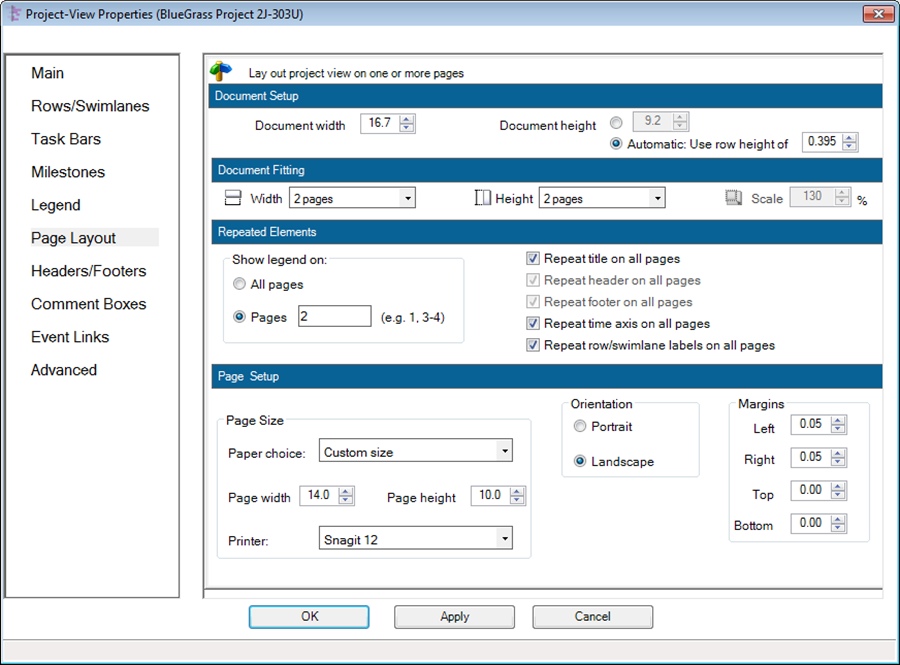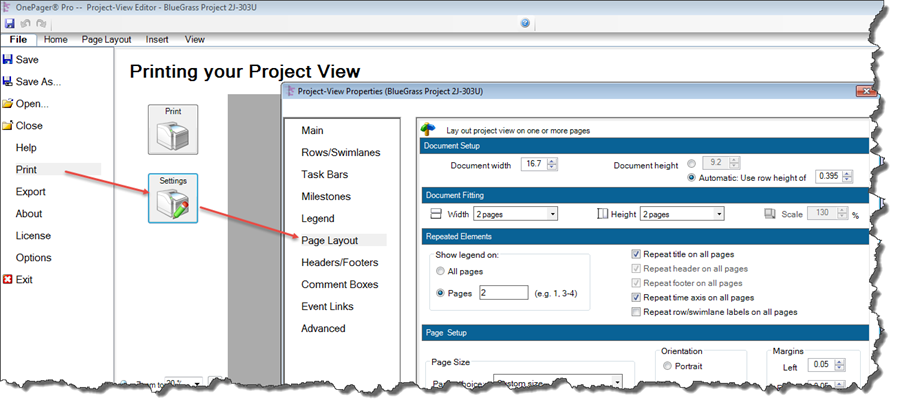Page Layout Tab
Contents
About the Page Layout Tab
This “Project-View Properties” form controls the features of OnePager Pro’s multi-page capability. There are four sections included as shown below. Each of the four sections is described separately in the sub-sections that follow:

Document Setup
1) Settings related to document height and width:
- a) Document height and width: These two settings determine the document’s size in inches or centimeters irrespective of page count. The overall document size consists of the graph area plus all “Adornment” areas (i.e., header, footer, time axis area(s), title, row labels, swimlane labels, margins). Document width is always “automatic” in that OnePager makes no attempt to keep the width constant as you change swimlane-label widths, row-label widths, or horizontal margins. Because the number of rows/swimlanes is very dynamic quantity, however, there are two modes for managing document height:
- i)Automatic-height mode: When the “Automatic: Use row height of:” radio button is clicked, the document height adjusts when rows/swimlanes are added/hidden. Likewise the document height adjusts if you change the title height, time-axis height(s), header/footer heights, or vertical margins. This mode is the preferred option because it preserves the heights of tasks and milestones.
- ii) Fixed-height mode: When the “Document Height” radio button is clicked, the document height is kept constant in the following situations:
- (a) Creation of the project view from a template.
- (b) Update of the project view by adding or replacing snapshots.
- (c) Automatic cropping of blank rows using the “Crop” button on the ribbon.
- (d) Change of parameters on the “Row/Swimlanes” tab of the Project-View Properties form.
- b) In all these situations, the document height is kept constant by adjusting the heights of all the rows and swimlanes to “take up the slack.” This is how OnePager behaved in releases prior to version 5.1. It has the disadvantage that adding many new rows causes tasks/milestones to get very short and hiding many rows causes task/milestones to get very tall.
- c) Even in this fixed-height mode, manual insertion/hiding of rows/swimlanes, changes to header heights, changes to title height, and changes to time-axis heights will alter the document height so as to preserve the heights of all the tasks and milestones in the graph area. You can always restore the old document height by entering it in the document-height control.
Document Fitting
2) The document fitting group determines the number of pages vertically and horizontally. There is a complete discussion of these controls with examples at the “Document Fitting” sub-group of the “Page Setup”, “Document Fitting, and Repeating Elements” sub-group of the “Creating Multi-Page Views” group above.
Repeated Elements
3) The repeated elements group has two sets of controls over repeated elements: (1) for repeating the legend on multiple pages and (2) for controlling the repetition of other “Adornments” on multiple pages.
- a) For a discussion of the controls for repeating the legend on multiple-page please see the “Show Legend On” sub-group in the “Legend” tab sub-group of the “Understanding Project View Properties” section above.
- b) For a discussion of the controls for repeating view “Adornments” please see the “Repeating Elements” sub-group of the “Legend” tab sub-group of the “Understanding Project View Properties” section above.
- c) These two sets of controls are also available on the OnePager ribbon’s “Page Layout” tab.
Page Setup
4) The page set up group contains controls for (1) specifying physical page size of output, (2) setting the output page’s orientation (portrait or landscape), and (3) establishing the physical page’s margins.
- a) The page size group has the following controls:
- i) Paper choice: This list is built from the available choices associated with the printer selected. See below.
- ii) Page width and height: Displays the dimensions of the current page-size selection and lets you specify custom page dimensions.
- iii) Printer: Contains a list of printers known to Windows.
- b) The orientation group has two radio buttons from which you may select the orientation of the output page as either portrait or landscape.
- c) The margin group provides four window controls for you to set the left, right, top, and bottom margins in inches or centimeters.
- d) When controls in the “Page Setup” group of the “Page Layout” tab are changed, OnePager will update the corresponding controls in the “Print” form accessed through the “File” ribbon.
- e) These controls, discussed just above, are available on the OnePager ribbon’s “File” tab by first clicking the page’s “Print” tab button and then the “Settings” button which will bring up the “Project-View Properties” form’s “Page Layout” tab. The steps and results are shown below:

(21.1.8)